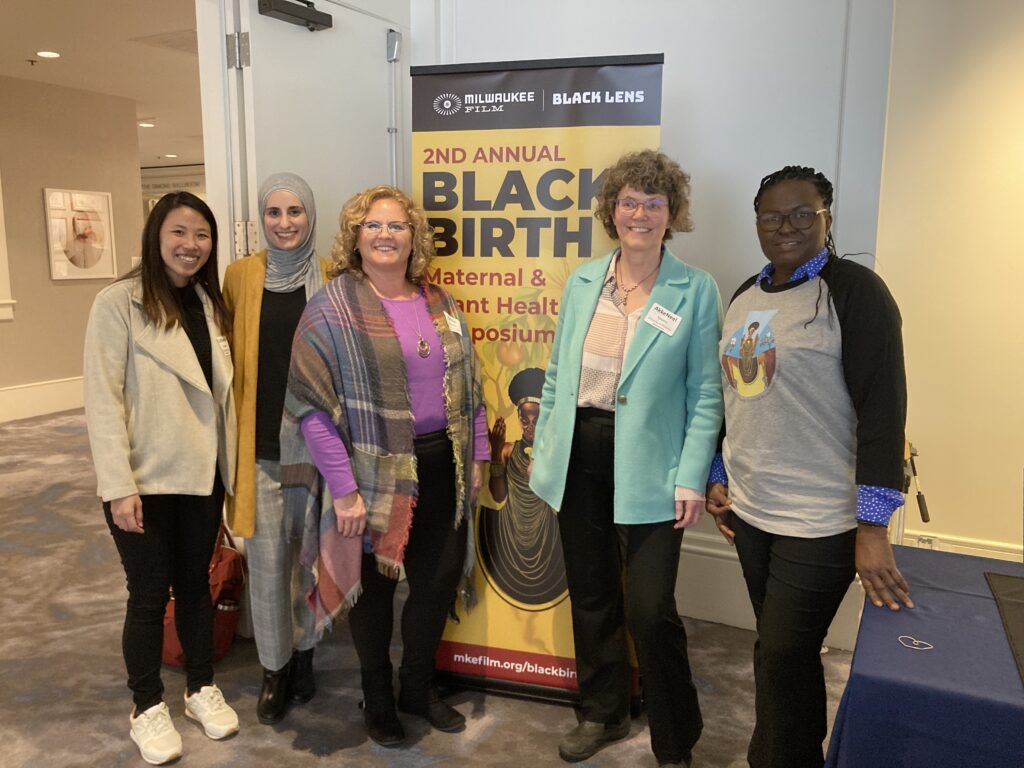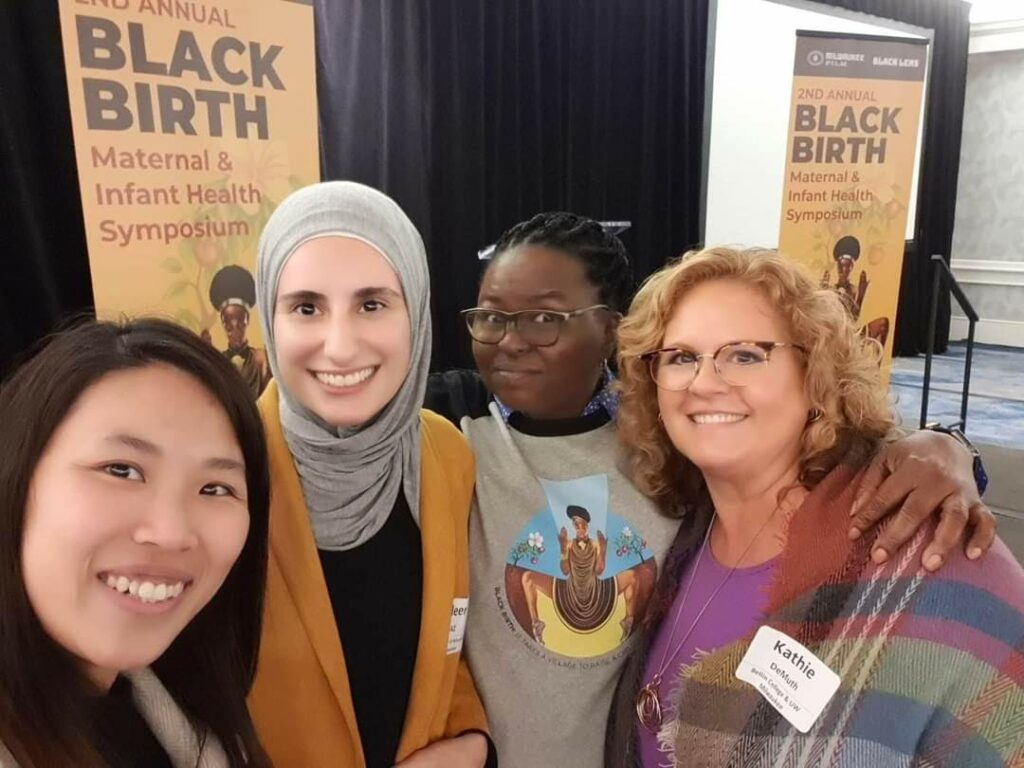The Milwaukee Black Birth Maternal & Infant Health Symposium was held at the Saint Kate hotel on March 25, 2023. The initiative brings together the larger Milwaukee community focusing on improving maternal and infant outcomes for Black and African American birthing people.
Well-known statistics (DHS article, March of Dimes article) demonstrate that women of color and rural women consistently have worse maternal health outcomes than white women. The Black Health Symposium sheds light the experiences of Black mothers and their challenges, vowing to come together for improvements.
UWM’s College of Nursing is well-known for its community involved research, in particularly related to maternal health. The College of Nursing launched the Wisconsin (WI) Maternal Infant Outcomes Studies (MIOS) program, led by Dr. Talsma, that aims to bring research to the community for better health and outcomes. College of Nursing doctoral students and faculty were present at the symposium and active participants in the various sessions. A few students reflected on their experience below.

Kathleen “Kathie” DeMuth
“I’m a maternal/child public health nurse, assistant professor of nursing, and PhD student interested in researching if the use of intersectionality education improves BSN students cultural safety and humility. It was very important for me to attend the symposium. Working to overcome this tragic disparity is extremely vital. The afternoon work sessions focused on community action plans. It was empowering to see the passion of many who actually want to put in the work and not just continue to talk about it. I was especially moved when Shawnee Benson told me how surprised she was to see my passion for this topic and for birthing persons of color because I’m a white woman. She said, ‘You’re a true ally. Thank you.'”
Tuleen Abu Zahra
“As a Palestinian who was born and raised in Jordan, I feel it is my obligation to stand against any injustices happening anywhere in the world. After attending the Black Birth Maternal & Infant Health Symposium, I have gained a better perspective on some of the African American struggles experienced in the American healthcare systems. The speakers and participants at the symposium have shared many of their personal stories about the healthcare system and its weakness when it comes to providing culturally competent care. We watched the Aftershock documentary, which tells the story of two young fathers, Omari Maynard and Bruce Mclntyre, who have lost their loved ones due to negligence and easily preventable childbirth complications. In the documentary, they mentioned how healthcare providers treat pregnant Black women as police would treat Black men. Living in the United States for over eight years now, I have attested to the many inequalities and injustices encountered by the African American race on a day-to-day basis and when seeking medical care. Thus, attending the symposium, which emphasized the need to change and start taking action, has inspired me to advocate for such injustices.
One quote that stuck with me was when one of the speakers stated, ‘the healthcare system is not broken; in fact, it is working perfectly the same way it was originally created to work.’ I have gotten so used to hearing people say how the system is broken and how it needs to be fixed; however, that statement has stuck with me because I never thought about it in that matter before. The system is not broken. It was meant to serve the majority, which happens to be the white people. I have learned from the event that every voice matters. It is our role to change the way the system is working and make it work in favor of everyone in this nation that proclaims to care about human rights and equality across all persons.”
Doris Richardson
“The Black Birth Maternal & Infant Health Symposium experience was an eye-opener for me as I listened to the experts, practitioners, and families who have suffered the loss of their loved ones narrating their painful stories of deaths that could have been prevented. In Ghana, although we experience maternal and infant mortality, it is not known which demographic groups suffer the most or are marginalized. Therefore, what I learned today is key for my doctoral program because the skills will be applied in Ghana to fight any form of health disparities, especially in vulnerable groups like women and infants.”
Chuthamas Payjapoh
“For the movie night program of the Black Birth Maternal & Infant Health Symposium, Aftershock presented the disparity of Black women in the maternal health system. As we know, the maternal mortality rate in Black women was three times higher than in white women. In the movie, Shamony Gibson and Amber Rose Isaac died from preventable childbirth complications. As a result, their partners and families have fought for justice and policy change. Also, they have shared their experience empowering and encouraging to build communities of support, including birthing workers, doulas, midwives, and OBGYNs.
‘We need the Black community to take care of Black women.’ This reminds me of the concept of ‘Cultural Care.’ Black pregnant women need healthcare providers who can assist, support, facilitate, or understand of being black, their beliefs, language, culture, and lifeways to improve their health and illness. However, the challenge is how healthcare providers provide the appropriate care for patients from different groups of cultures.
Moreover, I have learned that race/ethnicity, a component of social determinants of health (SDOHs), is a crucial factor leading to the disparity in the maternal health system. However, many other factors of SDOHs can contribute to health conditions. The CDC (2021) investigates the contributors to health, and the findings report that 20% of the nation’s health can be improved by medical care, 5% is the result of biology and genetics, 20% can be improved by changing individual behaviors, and the majority as over 50% is the results of social determinants (Ratcliff, 2017). Therefore, to improve maternal and infant health outcomes, the social determinants of health should be approached more seriously.”
Dr. Talsma commented that this was a moving program, and they were pleased to participate in and learn about our community’s need and moving forward. “It was an excellent program and wonderful to hear the speakers and engage in the sessions about the steps we need to take. I was very excited to meet with the speakers and community members and work together on our way forward”. We are looking forward to continue our work together.
